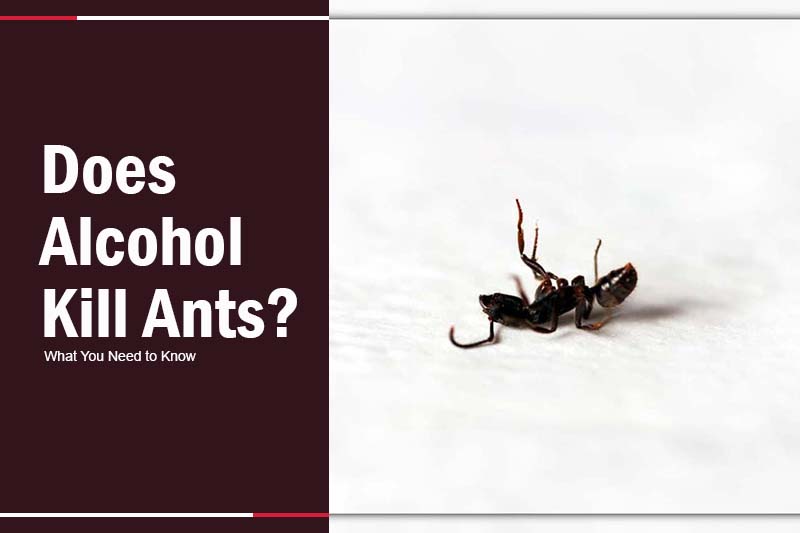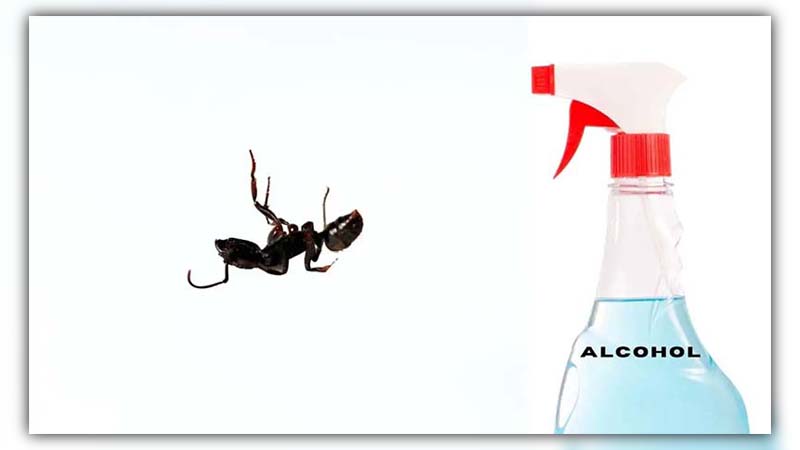In this blog, you will discover the answer to the question “Does Alcohol Kill Ants?” and learn how to use different types of alcohol to eliminate these pesky insects from your home.

1. Does drinking alcohol kill Ants?
Ethanol is also known as drinking or ethyl alcohol. It gives off a concentrated odor that can repel ants. This can either be sprinkled on them or used to wipe their trails.
It can also be poured into an anthill outdoors to kill and get rid of a whole colony of ants.
2. How to kill Ants with alcohol
This provides a natural method for eliminating ants without concerns about introducing harmful chemicals into your home. Creating the solution is a quick process.
- Step 1: Fill a spray bottle with water.
- Step 2: Measure 1 tsp. of rubbing alcohol and add it to the spray bottle.
- Step 3: Measure 1 tsp. of dish soap and pour it into the spray bottle. Shake the mixture thoroughly.
- Step 4: Spray the solution on any areas where you’ve discovered ants. Directly apply the spray to the ants and anthill to swiftly eradicate the pests on contact.
3. How does alcohol repel Ants?
Alcohol repels ants in a couple of different ways.
- Firstly, the strong smell of alcohol disrupts the ant’s communication. Ants rely on scent trails to navigate and communicate with each other. By erasing these scent trails with alcohol, you can disrupt their activities and discourage them from the area.
- Secondly, the harsh and pungent smell of alcohol is also physically repelling to ants. The scent is so overpowering that it blocks the tiny breathing holes on their abdomen, causing discomfort and forcing them to retreat.
4. Alcohol for ants on Plants
Alcohol can also remove ants in potted plants. Do not spray concentrated alcohol above 25% ABV on plants. Doing so may kill the leaves and even cause stagnant growth.
However, diluted alcohol with less than 5% volume cannot have any negative effects on plants.
5. Does Alcohol kill Ant Eggs?
Ant eggs are soft and moist and alcohol can kill them by dehydrating and burning into their weak layers.
However, you need to ensure that they are well covered and soaked in alcohol. It takes about 1-2 hours for alcohol to completely destroy ant eggs.
6. Disadvantages Of Using Alcohol
While alcohol can be an effective ant killer, it also comes with a variety of disadvantages.
- One of the most significant disadvantages of using alcohol to kill ants is the risk to human health. Alcohol, especially in higher concentrations, gives off strong fumes that can be irritating and harmful if inhaled in large quantities.
- Alcohol is also flammable, creating a fire hazard when used in large amounts.
- Furthermore, alcohol can harm plants if not used properly. It can dry out plant tissues, causing them to wilt or even die.
- Lastly, the use of alcohol to kill ants is only a temporary solution. Unless you eliminate the entire colony, including the queen, new ants will likely appear after a short while.
FAQs
Is alcohol a safe and natural alternative to chemical ant killers?
While alcohol is a natural substance, it’s not necessarily safe to use as an ant killer, especially in large quantities or without proper precautions.
It can pose health risks to humans and pets if inhaled, ingested, or comes into contact with the skin, and it’s also harmful to many types of plants.
Will spraying alcohol around my house keep ants away?
Spraying alcohol can help to deter ants because it disrupts their scent trails and can kill them on contact.
However, it’s not a long-term solution because it doesn’t address the root of the ant infestation.
Conclusion
You have learned does alcohol can kill ants and how to use it effectively in your home.
Alcohol is a natural and safe method to get rid of ants, but it also has some drawbacks such as evaporation, flammability, and odor
If you want to learn more about how to deal with other pests, you can check out more blogs from Pestweek.

Calina Mabel has over 15 years of experience in the field of journalism and communications. Currently, Calina Mabel is the Content Writer for categories such as Cockroach, Ants, Bed Bugs, Mosquito, Rodent, Termite, and Flies on Pestweek.com. She aims to build content for these categories with a focus on providing valuable and accessible information to readers, in order to create the world’s largest knowledge community about Pests.
All content written by Calina Mabel has been reviewed by Emily Carter.


